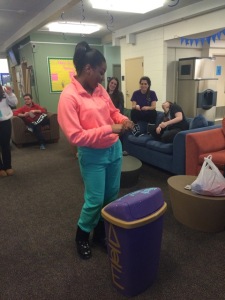Jene Thomas – General Assignment Reporter
According to the National Eating Disorder Association, approximately 20 million women and 10 million men in the U.S. suffer from an eating disorder at some point in their lives.
“Eating disorders don’t discriminate,” said Rachel Noto, a resident advisor in Hickerson Hall. “They affect people of all ages, all genders and demographics.”
Noto hosted the “Love Your Body” event in Hickerson Feb. 12 with help from the Delta Phi Epsilon sorority in order to bring awareness to eating disorders and to eliminate the stigma that only women suffered from the disease. The event brought in both male and female students from different parts of campus to participate and interact for National Eating Disorder Awareness month.
Delta Phi Epsilon was especially interested in the program due to the fact that National Anorexia Nervosa and Associated Disorders, ANAD for short, is one of their philanthropies. They brought along a trashcan, painted in their purple, gold and their letters so that participants could write down their insecurities and throw them away.
With markers provided, everyone wrote down their insecurities on a note card. One by one, each person walked, ran, smashed or dunked their card into the trashcan while everyone else cheered. People were given the chance to take pictures with their insecurities in order to help them embrace it before getting rid of it.
Four out of five women are dissatisfied with their bodies, according to Noto. However, she wanted to make it clear that it isn’t just women who have eating disorders and suffer from them. There were multiple guys who participated in throwing away their insecurity.
“It’s not just women that you associate eating disorder awareness with,” Noto said, “but it’s men as well and a lot of people don’t think of both genders.”
Behind her was a PowerPoint presentation that she had put together called “I Am Enough” to provide facts and statistics about eating disorders.
An eating disorder is defined by ANAD as a complicated and unhealthy correlation between what someone eats and their body weight, where someone could either over-consumption or under-eating could take place. Anorexia nervosa, bulimia nervosa and binge eating are some of the more common disorders.
Bernadette Gross, a senior special education major, attended the event volunteered to share personal struggles with anorexia and spread awareness. She said for a long period of time, there wasn’t any research on eating disorders, leading people to be oblivious. She has spoken aloud to groups, sharing her struggles and hopes to help others out there suffering. She created a blog on Tumblr where she posts inspirational tips on the matter.
“I was silent for so long about it and I finally decided to speak up,” Gross said.
Though the entire month is dedicated to eating disorder awareness, Feb. 23 to Mar. 1 is specifically National Eating Disorder Awareness week and Delta Phi Epsilon will host two events catered to awareness. A vigil will take place on Feb. 26 where people who have personally suffered from eating disorders can share their stories. A fashion show in collaboration with the F.A.C.E models will be hosted the next day to help people feel good in their own bodies.
Nicole Bairos, president of Delta Phi Epsilon, asks anyone interested in participation to talk to one of the sisters walking around campus wearing the letters. The events take place so that people can be aware of the different eating disorders out there and can know how to help themselves or others suffering.
“It’s going to be hard and it’s going to be hell but you’re going to get through it,” Gross said.
Photo Credit: Jene Thomas
























































































